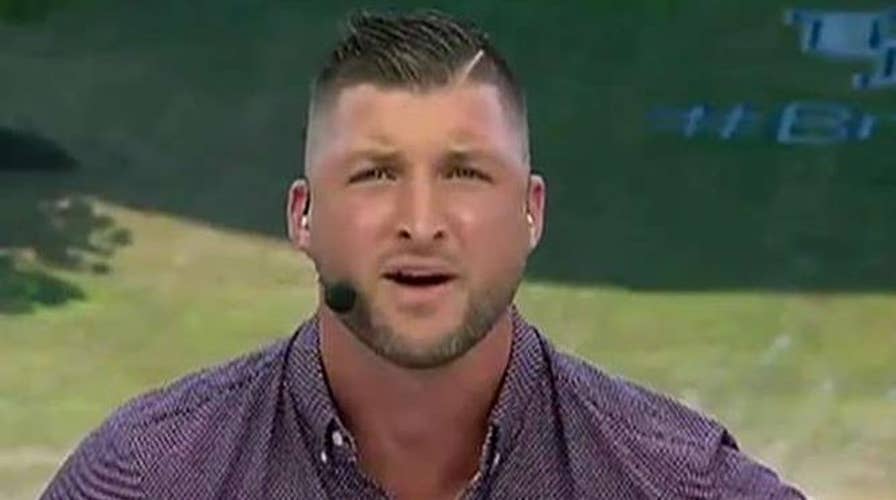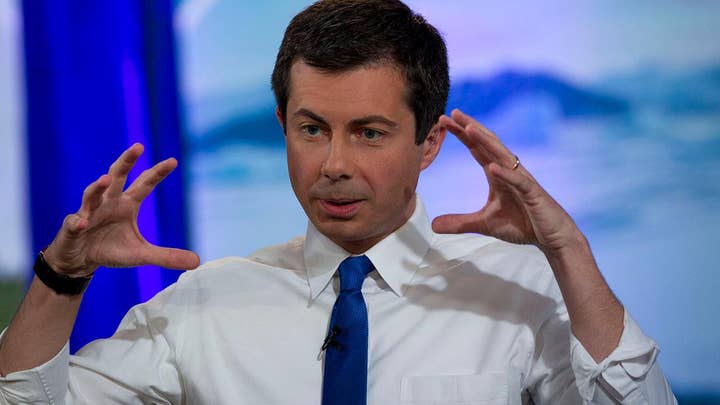Tim Tebow reignites heated debate on whether college athletes should be paid
Heisman Trophy winner Tim Tebow says college athletes should not stand to gain financially from merchandise sale; reaction from Fox News contributor Lawrence Jones, editor-in-chief at Campus Reform.
California Gov. Gavin Newsom on Monday signed a bill into law which will allow college student-athletes in the state to make money from images, names or likenesses.
The historic bill defies NCAA bylaws and likely sets up a legal challenge that could reshape amateur sports in the U.S. The law also bans schools from kicking athletes off the team if they get paid.
PETE BUTTIGIEG SAYS COLLEGE FOOTBALL MODEL, NOT PAYING ATHLETES IS 'PROBLEMATIC': REPORT
The law, which is set to take effect on Jan. 1, 2023, does not apply to community college and bans athletes from accepting endorsement deals that conflict with their schools’ existing contracts.
NCAA President Mark Emmert has spoken out against the bill. He reportedly told athletic directors last week that giving student-athletes the right to capitalize on their name, image and likeness poses an “existential threat” to athletics and the governing body’s business model.
Emmert met with a group of Division 1 athletic directors, CBS Sports reported, discussing the “single biggest issue” in college athletics – the debate over whether student-athletes should be able to make a profit on their name, image and likeness while playing NCAA athletics.
“My personal view is folks, in general, think that every student-athlete is going to be making hundreds of thousands of dollars,” Emmert told CBS Sports. “One or two will be making some significant amount of money. Nobody else will.”
NCAA TELLS CALIFORNIA GOVERNOR COLLEGE ATHLETE 'FAIR PAY' BILL IS 'UNCONSTITUTIONAL'
Emmert also expressed concern about the difficulty of working with players to help them receive compensation.
“You've got 50 different states with 50 different labor law rules,” Emmert told CBS Sports. “If you move into what are, in essence, labor negotiations, you have to do that state-by-state … It just falls apart in its complexity.”
California is home to 58 NCAA-member schools, including powerhouse programs at USC, Stanford and UCLA.
The NCAA warned the Democrat governor that allowing the bill to pass would upend the balance of college sports. The NCAA has asked Newsom to reject the bill – which he had 30 days to pass.
Membership in the NCAA, the top governing body for college sports, is voluntary. Athletes can get valuable scholarships, but the NCAA has long banned paying athletes to preserve the academic missions of colleges and universities.
NCAA SHOULD PAY COLLEGE ATHLETES, KENTUCKY GOVERNOR SAYS
The debate over paying college athletes has raged in recent years as some schools rake in millions from their athletic programs -- mostly from football and basketball. Many college basketball athletes have left school early to sign lucrative NBA contracts.

UCLA Bruins wide receiver Jordan Lasley (2) catches a pass fora first down over Arizona State Sun Devils defensive back Kobe Williams (5) in the first half of a NCAA college football game at the Rose Bowl in Pasadena, Calif., Saturday, Nov. 11, 2017. (Photo by Keith Birmingham, Pasadena Star-News/SCNG)
The league now requires players to be at least one year removed from high school before entering the draft.
The NCAA has a history of coming down hard on players for receiving compensation or gifts of any kind.
Donald De La Haye, a former University of Central Florida kicker, had his football scholarship taken away by the school in 2017 because of the revenue he was generating from his YouTube channel. The NCAA determined his videos were a violation of eligibility rules, according to the Orlando Sentinel.
CLICK HERE FOR THE ALL-NEW FOXBUSINESS.COM
Former Texas A&M quarterback Johnny Manziel got into trouble with the NCAA for allegedly signing autographs for money. He was suspended for the first half of the first game of the 2013 season for violating an NCAA bylaw about athletes' use of names and images, but it was later made clear Manziel didn’t receive money for the autographs.
The Associated Press contributed to this report.

